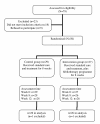Effectiveness of a self-help manual on the promotion of resilience in individuals with depression in Thailand: a randomised controlled trial
- PMID: 22339984
- PMCID: PMC3298500
- DOI: 10.1186/1471-244X-12-12
Effectiveness of a self-help manual on the promotion of resilience in individuals with depression in Thailand: a randomised controlled trial
Abstract
Background: The prevalence of depression is increasing markedly in Thailand. One way of helping people with depression is to increase their resilience; good resilience is associated with positive outcomes in depression. The purpose of this study was to examine the effectiveness of a self-help manual on the resilience levels of individuals with depression living in the community in Chiang Mai Province in northern Thailand.
Methods: Fifty-six participants with a diagnosis of moderate depression were assigned randomly to either an intervention (n = 27) or control (n = 29) group by means of independent random allocation, using computer generated random numbers. Fifty-four completed the study (two were excluded shortly after baseline data collection), so an available case analysis was undertaken. The intervention group were given a self-help manual and continued to receive standard care and treatment, while the control group continued to receive standard care and treatment. Both groups were also given a short weekly telephone call from a researcher. Participants were assessed at three time points: baseline (Week 0), immediate post-test (Week 8), and follow-up (Week 12). Data were collected between October 2007 and April 2008.
Results: The findings showed statistically significant differences between the intervention and the control group, and within the intervention group, in their resilience levels. Simple main effects analyses of group within time showed a significant difference between both groups at follow-up (p = 0.001), with the intervention group having a higher resilience score than the control group. Simple main effect of time within the intervention group showed a significant increase in resilience scores from baseline to post-test time points (p < 0.001), from baseline to follow-up (p < 0.001), but not from post-test to follow-up (p = 0.298).
Conclusions: The findings provide preliminary evidence supporting the use of bibliotherapy for increasing resilience in people with moderate depression in a Thai context. Bibliotherapy is straightforward to use, and an easily accessible addition to the standard approach to promoting recovery. It is incorporated readily as an adjunct to the work of mental health nurses and other professionals in promoting resilience and enhancing recovery in people with moderate depression in the community.
Trial registration: http://www.ANZCTR.org.au/ACTRN12611000905965.aspx.
Figures
References
-
- Department of Mental Health. Number and rate per 100,000 populations of mental health consumers of Thailand, as province categories in 1997. 2007. http://www.dmh.go.th/report/population/province.asp?field24=25402007
-
- Jamison C, Scogin F. The outcome of cognitive bibliotherapy with depressed adults. J Consul Clin Psych. 1995;63(4):644–650. - PubMed
-
- Jorm AF, Griffiths KM, Christensen H, Rodgers B. Effectiveness of complementary and self-help treatments for depression. Med J Aust. 2002;176:84–95. - PubMed
Publication types
MeSH terms
LinkOut - more resources
Full Text Sources
Miscellaneous


